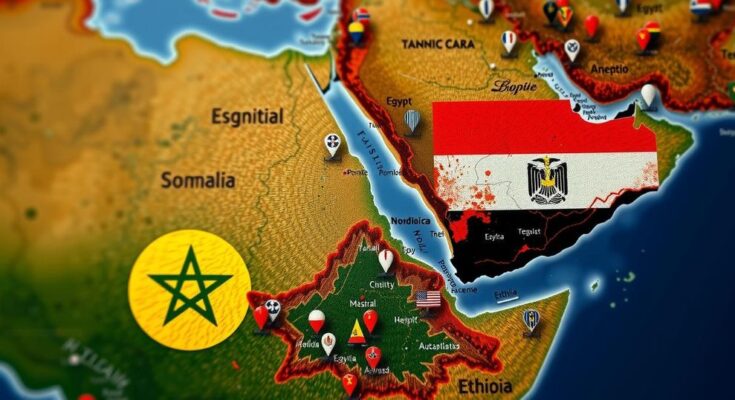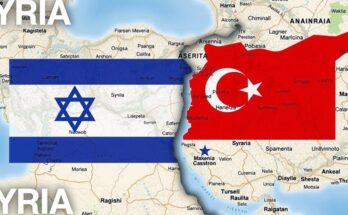The new defense agreement between Somalia and Egypt is destabilizing relations with Ethiopia, threatening the region’s security and worsening the fight against al-Shabaab. As Ethiopia’s military role is undermined, this could lead to increased violence and exploitation by al-Shabaab, necessitating urgent European intervention to stabilize the situation and support beneficial diplomatic efforts.
The escalating tensions between Egypt and Somalia with Ethiopia pose a serious threat to regional security, particularly in the fight against al-Shabaab, the jihadist group actively destabilizing Somalia. With Egypt’s recent defense pact with Somalia, Ethiopia’s role as the primary military force in the region is severely undermined, risking a fragmentation of the coalition fighting against al-Shabaab. Increased infighting among anti-al-Shabaab forces coupled with a potential reduction in Ethiopian military support could enable the group’s expansion, endangering not only Somalia but also the broader Horn of Africa region. Despite progress in military campaigns against al-Shabaab, the group retains significant control over parts of Somalia. Internal divisions within the Somalian federal structure further complicate unified resistance against al-Shabaab’s insurgencies. The defense agreement between Somalia and Egypt could exacerbate these tensions, leading to potential conflict between different factions aligned with Egypt or Ethiopia. If Ethiopian troops are sidelined, the lack of international military support could create a security vacuum, allowing al-Shabaab to capitalize on unrest and fragmentation within the country’s governance. Historically, the African Union (AU) has played a pivotal role in combating al-Shabaab through peacekeeping missions supported by countries including Ethiopia. Current developments undermine this structure as Egypt and Somalia seek to displace Ethiopian influence. There are concerns that removing Ethiopian troops would not only weaken military efforts against al-Shabaab but could also destabilize local governance. The AU’s looming mandate expiration adds urgency to the need for rapid diplomatic interventions to prevent further deterioration of security conditions in Somalia. The broader ramifications of these developments hold significant geopolitical implications for the surrounding nations and European interests in the region. The potential withdrawal of Ethiopian forces could draw Ethiopia deeper into ongoing hostilities with al-Shabaab, significantly disrupting security in the Horn of Africa. Such instability may harm European humanitarian efforts and complicate military operations by EU allies stationed in the region, including Kenya, which is already grappling with its own security challenges posed by al-Shabaab’s influence. Europe has invested heavily in Somalia’s security over the years, making it crucial for EU member states to leverage their influence to facilitate mediation between conflicting parties. Italy and the United Kingdom are well-positioned to lead these efforts, promoting dialogue to pacify escalating tensions between Egypt and Ethiopia. Meanwhile, the EU should consider engaging additional influential partners, such as Turkey and the United Arab Emirates, to support stability in Somalia through coordinated security initiatives. Ultimately, the EU’s ability to maintain funding for military missions against al-Shabaab remains vital in preventing further chaos and preserving regional stability in the Horn of Africa.
The situation involving Somalia, Egypt, and Ethiopia represents a complex geopolitical struggle with roots in historical tensions and contemporary military dynamics. Somalia’s government has sought to partner with Egypt in defense matters, leading to heightened frictions with Ethiopia, which has been a primary military contributor to anti-al-Shabaab efforts. This evolving partnership puts at risk the ongoing African Union peacekeeping missions critical to stabilizing Somalia and combating the enduring threat posed by al-Shabaab. As a pivotal player in the region, Ethiopia’s policies and military posture are crucial to understanding the broader implications for local governance and security measures.
The entrenchment of Egypt’s defense ties with Somalia amid a backdrop of antagonisms with Ethiopia poses escalating risks to security in Somalia and the wider Horn of Africa. If the current trajectory of infighting within the anti-al-Shabaab coalition continues, the resulting power vacuum could allow al-Shabaab to exploit instability and expand its territorial control. Timely European intervention through mediation and coordination with key regional players is essential to stabilize the situation and avert a substantial security crisis. Ultimately, the EU’s strategic role and financial commitments to Somalia’s security landscape are indispensable in maintaining a unified front against extremist groups and securing regional stability.
Original Source: ecfr.eu




